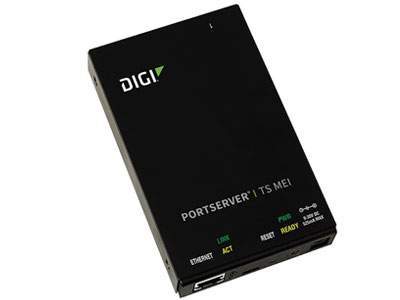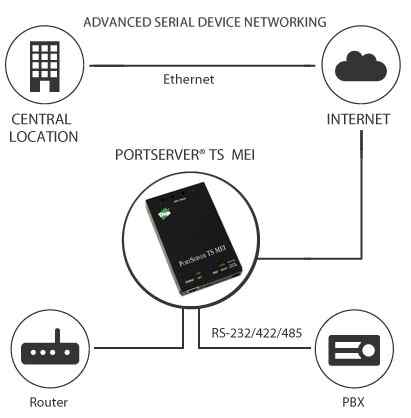PortServer TS MEI
RS-232/422/485 Switch Selectable Expansion. 1, 2 or 4 serial ports

- RS-232/422/485 switch selectable serial ports
- 1, 2 or 4 serial ports
- Serial port expansion for manufacturing floor, gas pump, Industrial Automation
- RealPort® with encryption provides SSL-based protection
- SSHv2 for encrypted connections
| Item | PortServer TS 1 MEI | PortServer TS 2 MEI | PortServer TS 4 MEI |
|---|---|---|---|
| Part Number | 70001805 | 70001806 | 70001807 |
| Features | |||
| Management | HTTP/HTTPS, CLI, SNMP (read/write), Digi Port Authority - Remote management diagnostics and auto-discovery tool | ||
| Protocols | UDP/TCP, DHCP/RARP/ARP-Ping for IP Address assignment, Extended Telnet RFC 2217, Telnet, PPP Reverse Telnet, Modbus to Modbus/TCP protocol conversion support, Reverse SSH | ||
| Software | Supports Digi’s Realport® COM port redirector | ||
| Status LEDs | Link, Activity, Power, Status | ||
| Dimensions (L x W x D) | 5.25 in x 3.33 in x 0.95 in (13.34 cm x 8.46 cm x 2.42 cm) | ||
| Weight | 2.25 oz (64.00 g) | ||
| Security | SSHv2, SSL/TLS | ||
| Operating Systems | AIX, HP-UX, Solaris, Linux®, Windows® 2000, Windows® XP, Windows® 7, Windows® 8, Windows® 8.1, Windows® 10, Windows Server® 2003, Windows Server® 2008, Windows Server® 2012. Note: TCP/UDP socket services are operating system independent | ||
| Other | Full modem and hardware flow control, Modem emulation, Port buffering, RJ45-DB-9F console adapter included for optional serial configuration | ||
| Interfaces | |||
| Serial | |||
| Ports | 1 RS-232/422/485 RJ-45 (switch-selectable); Up to 230 Kbps throughput; Signal support for TXD, RXD, RTS, CTS, DTR, DSR, DCD | 2 RS-232/422/485 RJ-45 (switch-selectable); Up to 230 Kbps throughput; Signal support for TXD, RXD, RTS, CTS, DTR, DSR, DCD | 4 RS-232/422/485 RJ-45 (switch-selectable); Up to 230 Kbps throughput; Signal support for TXD, RXD, RTS, CTS, DTR, DSR, DCD |
| Ethernet | |||
| Ports | 1 RJ-45 10/100 Mbps 10/100Base-T (auto-sensing); Full or half duplex | ||
| Power Requirements | |||
| Power Input | 9-30 VDC with locking barrel power connector | ||
| Power Supply (Included) | North America: 12 VDC/.5A max out; 120 VAC in (wall mount); International: 12 VDC/.5A max out; 100-240 VAC in (small brick) | ||
| Power Supply | 12 VDC extended temperature power supply sold separately | ||
| Power Consumption | Typical: 4 W; Max: 6 W | ||
| Product Surge Protection (ESD) | 4 kV burst (EFT) per EN61000-4-4, 2 kV surge transient per EN61000-4-5 | ||
| Environmental | |||
| Operating Temperature | 0° C to +60° C (32° F to 140° F) | ||
| Storage Temperature | -40° C to +85° C (-40° F to +185° F) | ||
| Relative Humidity | 5% to 95% (non-condensing) | ||
| Ethernet Isolation | 1500 VAC min per IEEE802.3/ANSI X3.263 | ||
| Serial Port Protection (ESD) | 15 kV human body model | ||
| Regulatory Approvals | |||
| Safety | UL/CUL 60950, IEC 60950 & CB | ||
| Emissions/Immunity | CE, FCC Part 15 (Class A), EN55024, EN55022 Class A, AS/NZS 3548, CISPR 22, VCCI V-3/99.05 | ||


PortServer TS MEI
RS-232/422/485 Switch Selectable Expansion for Asynchronous Connectivity
PortServer TS MEI (Multi-Electrical Interface) serial servers offer RS-232/422/485 serial port expansion, making it easy to connect any serial device to your network. Available in one-, two-, four-, eight- or 16-port models, these serial servers combine the inherent benefits of data networking with proven asynchronous connectivity. They deliver powerful, yet simple Ethernet connectivity for all your serial devices.
PortServer TS MEI device servers deliver universal and powerful features including data security via SSHv2, port buffering, and full SNMP management, making them ideal for serial port expansion application including manufacturing floor, gas pumps and industrial automation, where device management and monitoring are critical.
All Digi device servers include Digi’s patented RealPort® COM port redirector technology, which makes it possible to establish a connection between the host and networked serial device by creating a local COM or TTY port on the host computer, allowing existing software applications to work without modification.